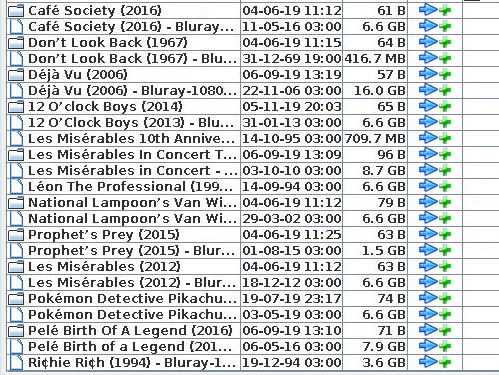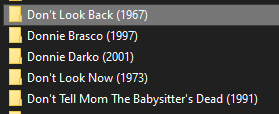-
Posts
802 -
Joined
-
Last visited
Content Type
Profiles
Forums
Downloads
Store
Gallery
Bug Reports
Documentation
Landing
Posts posted by IamSpartacus
-
-
15 hours ago, ezhik said:
You want to make sure you avoid circular dependencies and shoot yourself in a foot. If your unRAID is also hosting VMs such as pfsense which is used for internet access, you might end up offline and with array offline.
Was this directed at me?
-
On 1/25/2021 at 5:19 PM, ezhik said:
If you are not concerned with having the keyfile on the server's USB stick, then you can modify the 'go' file to automatically copy the file to auto decrypt the array.
I used an image (which I obviously backed up).
Copy the file to /boot/config/keyfile
Create a 'go' entry to copy the file from /boot/config/keyfile to /root/keyfile
--
# cat /boot/config/go #!/bin/bash # Start the Management Utility /usr/local/sbin/emhttp & cp /boot/config/keyfile /root/keyfile
To picky back off of this, you can also autostart your encrypted array without having the key stored on your USB. I edited my go file to auto start my array with the key on a network device connected to my network across a site to site VPN connection that is offsite. There are other options as well such as what's shown in this video.
-
 1
1
-
-
On 9/10/2020 at 11:35 AM, dmacias said:On 8/31/2020 at 11:57 AM, IamSpartacus said:Has anyone gotten fio to successfully run? I just get "illegal instruction" even with --disable-native set. I've tried this in both 6.9 beta 25 and 6.8.3 stable.
I updated fio. Try again and let me know
This worked, thank you!
-
 1
1
-
-
Would it be possible to add mergerfs into the Nerd Pack?
-
19 hours ago, MatzeHali said:
Hi,
it’s a native UnRAID installation on a 16core Xeon with 144GB RAM!
I think I installed FIO via Nerdtools, too!
Cheers,
M
Thanks for the response. I'm sure my issue is because Unraid is running in a VM. I'm probably SoL.
-
Were you running those fio tests on Unraid or another system? I ask because I'm testing a scenario running Unraid in a VM on Proxmox with an all NVMe zfs pool added as a single "drive" as cache in Unraid. However, I'm unable to run fio even after it's installed via NerdTools. I just get "illegal instruction" no matter what switches I use.
-
Has anyone gotten fio to successfully run? I just get "illegal instruction" even with --disable-native set. I've tried this in both 6.9 beta 25 and 6.8.3 stable.
-
Fixed this by simply doing an erase on the disk via the preclear plugin.
-
Having trouble finding the command to delete a (non-cache) btrfs pool that was created using this method. The pool currently has a single device in it but I can't for the life of me find the command needed to blow the pool away completely. Trying to delete the partition from UD fails as well. Any ideas?
-
I'm seeing the samba service using a lot of memory and not releasing it on a consistent basis.

I have samba shares from this server mounted to another Unraid server and do lots of file transfers (radarr/sonarr imports, tdarr conversions) between them. But even unmounting those shares does not release the used memory by samba.
Maybe someone can enlighten me on what could be causing this memory usage to remain even when no shares are in use.
-
30 minutes ago, JoergHH said:
Hi!
I have the following problem with the plugin:
The "Number of days to keep backups:" field accepts no numeric entries except 0 (zero).
The field "Number of backups to keep:" is already set to default = '0' (zero).You probably have to set the number of backups to keep number to something other than 0 first.
-
Well than there's my answer. I suspect Radarr is the cultprit as it's constantly upgrading movie qualities.
-
36 minutes ago, trurl said:
Take a look at the shares folder in those diagnostics you posted.
You have a number of .cfg files for shares that have no files. These are .cfg files for shares that no longer exist. And you have "duplicate" .cfg files for shares that do have files but have default settings. I say duplicates because the diagnostics use DOS filenaming conventions, which are not case sensitive, so when a file has the same name as another in the same folder, it has (1) appended to it.
Probably at some point you managed to create top level folders with a different case than you had specified when setting up user shares. This can happen when you use the wrong case when specifying a path such as the host path in a docker mapping. Those top level folders become user shares also since any top level folder on cache or array are part of a user share named for the folder. And of course, linux is case-sensitive, so if you have top level folders with the same name except for case, they are different user shares.
Those share .cfg files in the diagnostics that do not have default settings are actual .cfg files on your flash drive in config/shares, but some of them don't actually correspond to a user share anymore since they have no files. Those share .cfg files in the diagnostics that have default settings don't actually have corresponding .cfg files on your flash, but they do have files and the corresponding user shares have default settings.
The default for Use cache is No. So it seems likely that some of your user shares are actually cache-no.
Ok so I see all the extra share cfg files. Most of those shares don't exist anymore and I've confirmed none of those folders exist on any of my disks. The only shares I have left are the following:
Furthermore, while those shares were originally created with capital letters, they've all been converted to lower case. I guess the 'mv' command while changing the directory case does not change the share.cfg file, I'll have to fix that. The only shares that are set to Use Cache = Yes (meaning they eventually write to the array) are 4k, media, and data. And on every disk, those top level folders are indeed lower case. I've also confirmed all my docker templates reference the lower case shares. I've also just done a test file transfer to each share and every transfer wound up on cache and not on any of the disks.
So if all the top level folders are correct on each of the disks to match the current shares, I'm not sure what could be causing the disk spin ups.
QUESTION: If say radarr/sonarr are upgrading a file quality that exists on the array, would that cause a parity write during the write to cache since sonarr/radarr is technically deleting the previous file and overwriting it with the new/better quality version?
-
I'm looking for some help in identifying what is causing my parity drives to constantly spin up. Every single one of my shares uses the cache drive and I only enact the mover once per day. Yet my parity drives are constantly being spun up periodically even though my disk spin down is set for 1hr of idle time. My data disks spin down and stay down unless the shares are being accessed, but I'm constantly seeing parity drives up during the day.
So my question is, what could be causing parity writes to the array when all my shares use cache and none write directly to the array?
-
6 hours ago, ich777 said:
One thing, doesn't DirSyncPro has something like scheduled syncing built in? I may be wrong but i think there is an option...
It does, I'm using it now and it works well.
-
 1
1
-
-
6 minutes ago, ich777 said:
I don't recommend real time synchronisatzion and also the filesystem must support this...
I do scheduled backups with a cron job to start the container with the headless option.

Got it, sounds like that should work. How does one run the container with the headless option? And is there a shutdown option for once jobs are complete?
-
-
8 hours ago, ich777 said:
Yep, jou have to set it to local and then create a new mount point (or edit your existing mount point) to /mnt/disks/[nameofyoursmbshare]
Thank you. That seems to have fixed the issue. I don't know why the characters were an issue with the smb option but when the destination is set as a local mount point (via UD SMB mount) it works without issue and identifies the files on both ends are identical thus not creating any duplicates.
-
 1
1
-
-
1 hour ago, ich777 said:
Sorry forgot to ask a SMB share on another server? If you mounted it not through the UD plugin please try it with the plugin and select in the template R/W Slave.
If I mount the destination SMB share via UD, how do I notate that in the docker template? Local? Because if I still use remote, I'm not sure what's changing.
-
3 minutes ago, ich777 said:
Please report back if you got the problem again, where is the destination? Is it on a smb share or did you mount it through the Unassigned Devices plugin if you mount it with UA don't forget to mount it with R/W Slave.
I'm doing a sync now. Will let you know what the result is. Destination is an SMB share, it's not mounted locally via UD.
-
Hmmmm. I guess I'll delete the files off destination and let them copy over with DirSyncPro and then see what happens upon the next analysis.
-
 1
1
-
-
Try just creating a folder named Déjà Vu (2006) with a text file with the same name inside it. Or try this actual video file.
And btw, I'm using a local for source and smb for destination.
-
2 minutes ago, ich777 said:
Oh, than it's not unicode, hmmm, have you got a small file that you can zip and send over so that i can look into it?
How small we talking? 1.5GB too big?
-
So it looks like any file with an accent and files that look like they have an apostrophe but it's someone not the apostrophe that you'd get if you hit the key on a standard keyboard. So it must be another accent of some kind. These files are all automatically named with Sonarr/Radarr so i'm not sure how they were named with these characters like that.

I discovered these file are not using a standar apostrophe by noticing how they were ordered in WIndows Explorer:










Precautions before encrypting array disks with LUKS
in Security
Posted
Yes if the remote end of my VPN is down I'd have to manually start the server but thats extremely rare and I'm ok with that.